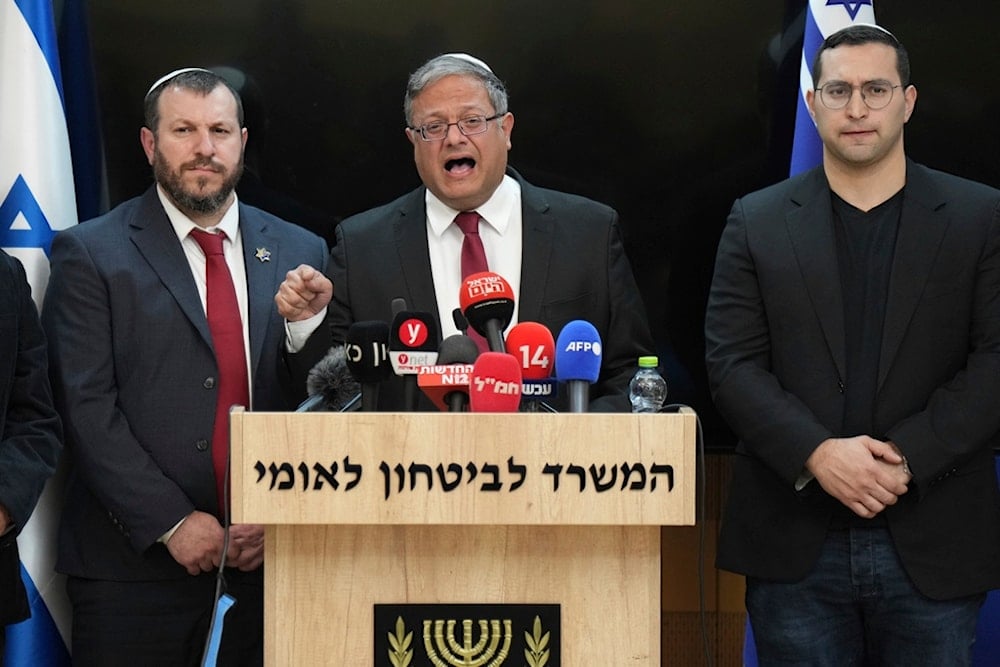Ben-Gvir urges Netanyahu to reverse Gaza aid plan
The far-right minister condemned the move as a "strategic mistake," and insisted that no aid should be allowed into Gaza unless it is exchanged for the release of Israeli captives.
-

"Israel's" Police Minister Itamar Ben Gvir, left, addresses the media as he enters a courtroom in Tel Aviv before the start of Prime Minister Benjamin Netanyahu's hearing Tuesday, Dec. 10, 2024 (Pool Photo via AP)
Israeli Police Minister Itamar Ben-Gvir has called on Prime Minister Benjamin Netanyahu and members of "Israel's" military-political cabinet to overturn a recent decision permitting limited humanitarian aid into the besieged Gaza Strip.
Writing on Telegram Friday, Ben-Gvir declared: "I call on the prime minister and my fellow ministers to cancel the catastrophic decision to resume humanitarian aid in the Gaza Strip at the next cabinet meeting, which I voted against at the previous meeting."
The far-right minister condemned the move as a "strategic mistake," and insisted that no aid should be allowed into Gaza unless it is exchanged for the release of Israeli captives. His statement follows the cabinet's decision last Saturday to conditionally approve international aid deliveries, only if they bypass Hamas and further dismantle its administrative functions.
Ben-Gvir's demand comes as Israeli forces continue their devastating campaign on the Strip, now in its 19th month, with airstrikes resumed on March 18 following the collapse of a short-lived ceasefire.
Since then, "Israel" has intensified its siege, cutting off electricity to a vital desalination plant and sealing border crossings, which has blocked thousands of trucks carrying food, medicine, and fuel. The blockade has accelerated what the United Nations now warns is a man-made famine, with over 65,000 children at risk of death from starvation, according to Gaza health officials.
Weaponized Aid
While the Israeli cabinet claims that any aid would be tightly controlled, human rights organizations and UN agencies have condemned these proposed frameworks as both inadequate and dangerous. Aid groups warn that the plans could force displaced Palestinians to cross active combat zones to receive basic supplies, putting their lives at further risk.
Earlier in the day, UN spokesperson Stéphane Dujarric urged that "aid must reach everyone, wherever they are, based on their needs," adding that the situation on the ground has become untenable after nearly 10 weeks of severe aid restrictions.
"The UN Office for the Coordination of Humanitarian Affairs says lifting the Gaza blockade is more urgent than ever," Dujarric said. "The humanitarian crisis has worsened significantly after nearly 10 weeks of aid being cut off."
He further warned that "any additional delay in the entry of aid into Gaza will have consequences that cannot be reversed." Dujarric reiterated UN Secretary-General António Guterres's stance that "the organization will not participate in any arrangement that does not respect humanitarian principles."
Read more: Stop the genocide or witness end of life in Gaza: UN experts warn
Ben-Gvir's remarks reflect a growing hardline push within "Israel's" leadership to weaponize humanitarian aid, holding food and medicine hostage as a political bargaining tool.
His call to halt even minimal relief highlights the cruelty of a policy framework that continues to prioritize collective punishment over basic human rights.

 3 Min Read
3 Min Read








